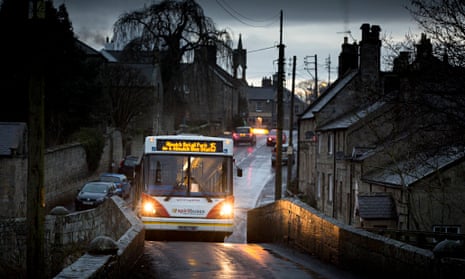John Harris’s piece (You wait ages for a bus … and then none come along, 25 August) was a refreshing look at the rural elephant in the room, and I thank him for it. If poor people, old people, and people with epilepsy, poor vision or heart problems were only allowed out of their village once a week in a foreign country, we would be rightly indignant. But this is exactly what is happening to thousands of people in England because of cuts to public transport funding.
Rural transport provision has probably halved in the last few years, yet recession, a large foreign workforce and increasing numbers of the elderly have meant that many more people need those buses that no longer run.
Most cannot imagine what it’s like to never be able to go anywhere on a Sunday, or to have to be home by six – no films, plays, music, parties, pubs, meals out or evenings with friends. If you are a rural non-car user you don’t have to imagine, because this is your reality.
The fault is that of successive governments, and the remedy lies in the hands of this one. If a tiny proportion of urban and metropolitan spending were to fund rural bus services, we would see a return to a more civilised life for so many people. How do we convince our MPs that life exists beyond the car?
Eden Blyth
Wrelton, North Yorkshire
John Harris is right to say that councils have been withdrawing many vital bus services in recent times, but he fails to point out that if it were not for commercial bus companies stepping in to save services up and down the country at a cost to their bottom line, cuts to services would be much deeper. There are countless examples where the commercial market has stepped in to keep services running which would otherwise have been lost.
Stagecoach has provided services in and around Manchester, and there are further examples in the east Midlands. Again, through working in partnership with local authorities, First has taken over a number of services in Bristol and the south-west, and in Newcastle GoNorthEast took over the QuayLink bus service, which connects key areas of the city and beyond. And this is in an area where the combined authority is actively pursuing proposals for a quality contract scheme.
The industry supports the government’s devolution policy but firmly believes the way forward lies in successful partnership working between operators and local authorities – not in complete local authority control, which would cost the taxpayer even more money. The partnership approach fosters flexible, locally managed commercial bus networks, encourages innovation and ensures that services meet the changing and diverse needs of customers and communities. Councils must recognise this when deciding how to use any new powers they will be given under the devolution agenda.
Pauline Gaunt
Deputy director of communications, Confederation of Passenger Transport UK
At last, an article on the menace of the cuts that are destroying so many bus services outside London. This week swingeing cuts will affect bus services across Hertfordshire. Tory-led Hertfordshire county council is going ahead with cuts that will affect numerous bus services across the county, despite strong opposition from the vast majority of people who responded to its so-called consultations.
Many people will be badly affected, especially those on low incomes who cannot afford a car or taxi and people with mobility problems. If those who have cars use them more often, as is likely to happen, this will mean a rise in air pollution as traffic emissions are the biggest single cause of fine particulate air pollution in Hertfordshire. It is outrageous that this carnage in bus services is hardly included in political debate. Decent bus services are a basic part of the fabric of our lives. Ministers not only don’t know the price of milk or bread. They don’t know the value of bus services, and they don’t care that they don’t know.
Linda Lennard
St Albans district Green party
Thank you, John Harris. At last someone in the national media has noticed that bus services outside London are not as ubiquitous and frequent as they are in the capital.
Last year’s axing exercise in North Yorkshire saved £2m, and they are now proposing further cuts to save £1.5m. Part of the problem is that the council has to compensate the bus firms for journeys made using free passes. This money is supposed to come from government grants and there is plainly a shortfall. David Cameron’s electoral pledge to keep the passes is therefore meaningless. A free bus pass is useless without buses.
To get these figures into perspective for Londoners, I have calculated that £2m would pay for just 16 metres of Crossrail.
John Illingworth
Bradford
